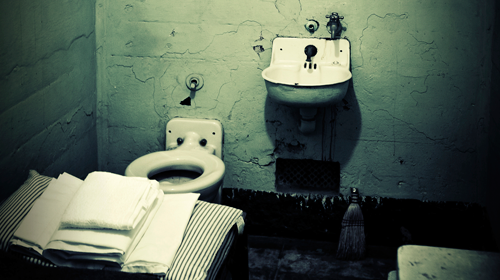This Prisoner's Note Isn't From Some Dystopian Dictatorship. It's From Texas.


Every day from dusk to dawn there's noise, banging, clanking, yelling, screaming. Everyday someone is getting hurt or hurting themselves. Everyday there's fire and floods and complete chaos & hateŌĆ”Every day is a challenge here. A challenge against insanity.
This sounds like a dispatch from a war zone or a maybe a line from some post-apocalyptic science fiction movie, but it's actually the description of a typical day in solitary confinement for Alex, a prisoner in Texas.
In a groundbreaking new report by the └Ž░─├┼┐¬Į▒Įß╣¹ of Texas and the Texas Civil Rights Project, "," we hear directly from Texas prisoners like Alex in solitary for the first time. The reality is grim. On any given day there are over 6,000 Texans in solitary. Texas locks more people in solitary confinement than 12 other states combined. Prisoners are forced to live in conditions that would break most human beings. The report shows that many of them become broken as a direct result of being in solitary.
It isn't hard to figure out why, when you know the dehumanizing conditions Alex lives in. His barren, windowless cell is the size of a bathroom. When he spreads his arms, his fingertips almost graze the walls. His cell door is made of solid metal with a slot for a food tray. Two thin slits also adorn the door, so officers can see him. Weeks pass when Alex doesn't even see another person's face or look another human being in the eyes. He hasn't seen the stars in 10 years.
Alex would like to educate himself, get counseling for the abuse he suffered as a child, and deal with the addictions that lead him to prison before he returns to society. But in solitary, all such programming is forbidden. Unless policy changes are made in Texas, Alex is likely to return to the community directly from his solitary cell. We know that direct release from solitary leads to higher rates of return to prison, but sadly, the majority of states still allow direct release.
In the face of these stark and dehumanizing conditions, Alex is trying to bring meaning to his life. He is trying to survive. But the screams from his neighbors' cells and the madness of the solitary unit get to him. He is afraid that he will go insane before going home. Many of his counterparts have already given into the madness.
Alex isn't alone in his fears. And Texas isn't the only state with a problem. There are over 80,000 prisoners in "restrictive housing" in this country where prisoners are held in extreme forms of isolation. Across the nation, prisoners like Alex spend months, years, and even decades in solitary confinement. This human rights crisis is blowing up in our own backyard.
Solutions exist and the sea change is upon us. The report sets forth several common sense strategies to reduce solitary in Texas, including such policy changes as:
- providing training to correctional officers to work effectively with people with mental illness
- removing seriously mentally ill people from solitary and ensuring access to mental health care for all prisoners in segregation
- ending the practice of directly releasing individuals to the community from solitary
- limiting the time anyone can be placed in solitary and ensuring that fewer people are ever placed in such units
- decreasing extreme isolation by providing positive social interactions and rehabilitative programming.
These strategies have worked in other jurisdictions, such as Colorado, New York, Maine, New Mexico, California, Washington, Massachusetts, and Mississippi. Both the public and our political leaders are now speaking out against solitary confinement. The U.S. Department of Justice reached agreement with the state of Ohio to end the practice of holding kids in state juvenile facilities in solitary and with the state of Pennsylvania to end the practice of holding individuals with serious mental illness in isolation.
The U.S. Senate has already held two hearings on solitary confinement and the need for reform. These hearings shone a national light on the problem of solitary confinement leading to greater attention from Congress. Last year, the to address the problem was introduced in the House. Even Texas itself has recognized the need to change by its population in solitary confinement by about a third in the last few years.
As a nation, we are close to a tipping point on solitary confinement. States around the country are beginning to roll back their severe isolation policies and reduce their reliance on this terrible practice. But real and lasting change requires more. We must have the strength and the will to abolish the practice and refocus our resources on criminal justice policies that actually promote both rehabilitation and public safety.
The only question now is "Do we?"
For Alex, and the thousands of other men, women, and children in solitary confinement in this country, our answer must be "Yes."
Learn more about the solitary confinement and other civil liberty issues: Sign up for breaking news alerts, , and .
